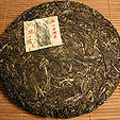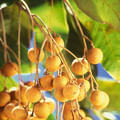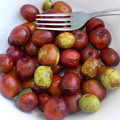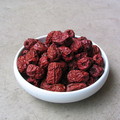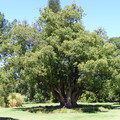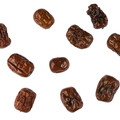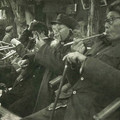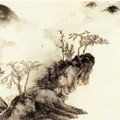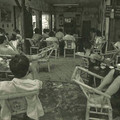Pleasant Surprise
 4.5 This review helped: 0 / 0
4.5 This review helped: 0 / 0
I was just curious about this tea, so I bought one mushroom. Puerh tea in the shape of mushroom is primarily intended for Tibetan market and it was produced since 1912. However, production was stopped in 1966 and at the request of Tibetan Buddhists it was reinstated in 1986 again. I did not have great expectations of this pu-erh tea. Mainly I wanted to taste what they drink in Tibet and I was pleasantly surprised. Tea with milk certainly was not a surprise.
The smell of wet leaves is the first to feel a touch of maturity , which then passes into a distinctive fruity aroma of ripe fruit with a touch of menthol in further sweepings. Tea contains large quantities of stalks, but also a fair share of tips. The quality of leaves varied, see attached photo.
I am steeping the first infusion a little longer about 30 to 40s, then the tea is full-bodied right from the start. Tea comfortably slips into the stomach. The taste is mellow and has a strong astringency. There is no bitterness. Aftertaste is also astringent and it then changed to honey- sweet end.
The second infusion - 15s, color of the brew is caramel brown - very pretty. Taste is fruity, round , mellow. There is very pronounced fruitiness in the aftertaste. It is returning to the mouth via nose after swallowing. There is still no bitterness. There is this cooling effect in the mouth when you inhale through your nose. Finally there is very slight bitterness in the aftertaste - I thought that perhaps it is not Bulang :) You can observable a mushroom taste in aftertaste in further brews (5th or more), it is not unpleasant.
Tea’s energy is quite aggressive. It starts from your belly and rises up to your head. It warms up everything along the way. When it reaches the head, it is better just sit back and relax or meditate.
I am adding a little bit of milk. Unfortunately I do not have yak’s milk and butter, only cow’s milk out of the box. Although brew’s color is very intense like caramel, added milk absorbs all the color and infusion has a very fine brown – white color. What has happened to the color of tea, also happened to taste. The complexity of flavors is now covered with milk. Fruit component, maturity completely disappeared. There is just milk flavor with a hint of bitterness in the aftertaste.
I understand that drinking tea with milk and yak butter is due to different cultural and mainly geographic differences. We cannot compare Tibet and our local conditions. In Tibet, it is mainly to diversify rather one-sided diet based on yak meat. In the film – Tea Horse Road – they say this about drinking puerh tea in Tibet : "The tea warms the body and give him the necessary calories to withstand physical stress. At the same time, it also helps to digest meat and deprives the body of butyric acid, which it accumulates at these altitudes. "
It is about 7 years old tea, nicely matured with a fruity flavor, cooling effect and expressive energy. It has good endurance. Tea is good to drink now, also it has more potential for aging for sure. For me, it's a pleasant surprise, especially when one considers the price of $11 per 250 grams. I ordered also Shu version of the same tea from 2007. So hopefully the package arrives till Christmas and I would share more tea experiences with you.
7g per 100ml , 99°C water - flush - 25s/10/15/20/25/30/35/40/50/60/70
Watch out for sourness for longer steeping times.
Was this review helfule? Yes / No
 1 review
Added 25.07.2013 by Eternal Spring,
Tea status: [227] A
7209x
1 review
Added 25.07.2013 by Eternal Spring,
Tea status: [227] A
7209x

 Shops
Shops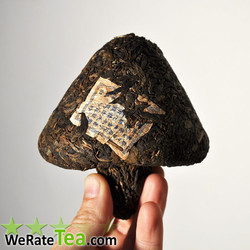










 Share on Facebook
Share on Facebook











